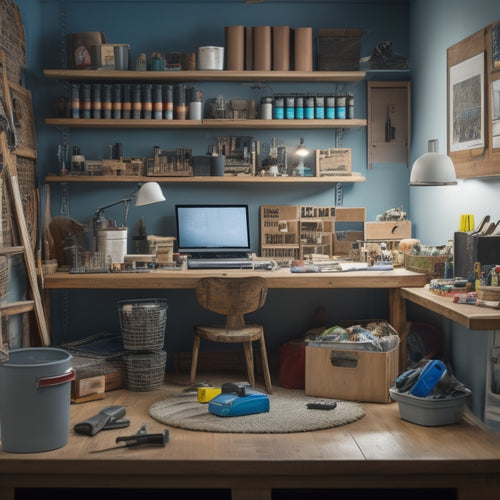
3 Best Decluttering Strategies for Busy Homeowners
Share
You can finally take control of your cluttered space by implementing three practical strategies that fit into your busy schedule. Start by decluttering in short bursts, using time blocking to maximize your productivity. Next, focus on high-impact areas like your kitchen counter and entryway, where clutter tends to accumulate. Finally, create a maintenance routine, setting aside specific times each week to keep your space organized. By incorporating these strategies, you'll be well on your way to a clutter-free home. Now, discover how to tailor these strategies to your unique needs and lifestyle.
Key Takeaways
• Dedicate short blocks of time (10-20 minutes) for decluttering using the Time Blocking technique to fit into a busy schedule.
• Focus on high-impact areas like the kitchen counter and entryway to create calm and control in essential spaces.
• Establish a maintenance routine with daily habits (10-15 minutes) and weekly tasks to maintain decluttered spaces.
• Customize decluttering strategies to fit your unique lifestyle and preferences, adjusting time blocks and frequency as needed.
• Set a timer to challenge yourself and track progress in short bursts, making decluttering a manageable and achievable task.
Decluttering in Short Bursts
When you're juggling a hectic schedule, dedicate short blocks of time, say 10 or 20 minutes, to decluttering, and you'll be surprised at how much you can accomplish. This technique is called Time Blocking, and it's a game-changer for busy homeowners. By allocating a specific time slot for decluttering, you'll be more focused and motivated to get the job done.
Before you start, take a few minutes for Mental Prep. Take a deep breath, visualize the clutter-free space you want to achieve, and remind yourself that every little bit counts. This mental preparation will help you stay committed to your goal and make the most of your limited time.
During your decluttering session, focus on a single area or task, like clearing a shelf or sorting through a box. Set a timer, and challenge yourself to make progress before the time runs out. You'll be amazed at how much you can accomplish in just a short burst of decluttering.
Focus on High-Impact Areas
Identify the areas in your home that have the greatest impact on your daily life, such as the kitchen counter or entryway, and prioritize decluttering these zones to maximize your time and energy. By focusing on high-impact areas, you'll create a sense of calm and control in the spaces that matter most.
| High-Impact Area | Why It Matters |
|---|---|
| Kitchen Counter | Prepares meals, central hub for family |
| Entryway | First impression, sets tone for the day |
| Home Office | Productivity and focus |
Create a Maintenance Routine
Set aside a specific time each week to maintain your newly decluttered spaces, ensuring that clutter doesn't creep back in and undo your hard work. This maintenance routine will help you stay on top of clutter and keep your home organized.
Start by establishing daily habits, such as tidying up for 10-15 minutes each morning or evening. This can include tasks like putting away dishes, wiping down countertops, and making your bed.
In addition to daily habits, plan for seasonal tasks to tackle clutter that accumulates over time. For example, schedule a monthly deep clean of a specific room or area, or dedicate a weekend to organizing your closet or garage.
By breaking down larger tasks into smaller, manageable chunks, you'll be able to maintain your decluttered spaces without feeling overwhelmed. Remember, the key is to be consistent and make maintenance a habit.
Frequently Asked Questions
How Do I Prioritize Items With Sentimental Value?
When faced with items holding sentimental value, you're torn between keeping and letting go. Create Memory Boxes for select items, acknowledging the Emotional Attachment, and set a "maybe" box for others, giving yourself time to reassess their significance.
What if My Family Members Resist Decluttering Efforts?
When family members resist decluttering, you'll face complex family dynamics and communication barriers. You'll need to address their concerns, involve them in decision-making, and find common ground to overcome resistance and achieve a clutter-free home.
Can I Declutter and Organize in a Small, Cramped Space?
You can declutter and organize in a small, cramped space by utilizing Space Savers like foldable containers and opting for Vertical Storage solutions like shelves and hooks to maximize your available space efficiently.
How Do I Handle Items That Are Still in Good Condition?
When faced with items in good condition, you'll encounter Donation Dilemmas and Resale Opportunities. Sort items into categories, research local charity options, and consider online marketplaces or consignment shops to turn your clutter into cash or goodwill.
What Are Some Creative Ways to Repurpose Old Items?
Did you know 70% of Americans prioritize living sustainably? You can join them by repurposing old items into unique Upcycled Decor pieces or giving them a Vintage Revamp, reducing waste and adding character to your space.
Related Posts
-

What Makes Effective Online DIY Home Organization Courses?
You're about to reveal the secrets to transforming your living space into a serene and functional oasis, and it all b...
-

What Makes the Best DIY Storage Ottoman?
When constructing your ideal DIY storage ottoman, consider essential features like color, size, upholstery, and compl...

